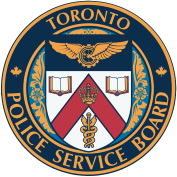
XL LE-013 – Police Response to Persons in Crisis
|
REPORTING REQUIREMENT |
Annual report |
|
LEGISLATION |
Police Services Act, R.S.O. 1990, c.P.15, as amended, s. 31(1)(c). Adequacy & Effectiveness of Police Services, O.Reg.3/99, s. 13(1)(g). Mental Health Act, R.S.O. 1990, c. M.7 |
It is the policy of the Toronto Police Services Board that:
- The Chief of Police will establish procedures and processes in respect of police response to persons in crisis;
- The Chief of Police will work, where possible, with appropriate community members and agencies, health care providers, government agencies, municipal officials, other criminal justice agencies and the local Crown Attorney to address service issues relating to persons in crisis;
- The Chief of Police will ensure that the Service’s skills development and learning plan addresses the training and sharing of information with officers, communications operators /dispatchers and supervisors on incident response protocols, including conflict resolution, ongoing de-escalation and use of force in situations involving persons in crisis;
- The Chief of Police will ensure that training with regards to police response to persons in crisis emphasizes that:
- The goal of the response is to end the incident as peacefully as possible;
- Members must use de-escalation methods on an ongoing basis wherever the threat or application of physical force is not necessary for the prevention of possible harm to the Member, the individual in crisis, or other members of the public; and
- Where application of physical force is determined to be necessary for the prevention of possible harm to the Member, the individual in crisis, or other members of the public, the Member will strive to use the least degree of force necessary for the achievement of this purpose, to the best of their judgement;
- The Chief of Police will establish, in collaboration with health system partners, a dedicated unit to respond to persons who are experiencing a crisis related to mental health or addictions, which will be:
- Composed of Service Members who received specialized training in de-escalation and mental health, and mental health professionals; and
- Available to respond to calls 24 hours a day, seven days a week;
- The Chief of Police will ensure that, where possible without causing undue risk to the public or Service Members, the dedicated unit will be prioritized as a first responder to incidents involving persons in crisis; and
- The Chief of Police will report to the Board annually on:
- The number of incidents involving persons in crisis to which a Service response was dispatched;
- The number of incidents in (a) that resulted in an arrest;
- The number of incidents in (a) that resulted in an apprehension in accordance with the Mental Health Act;
- The number of incidents in (a) for which a Use of Force form was completed;
- The number of incidents in (a) for which a complaint was filed or where the Special Investigations Unit invoked its mandate, and the disposition thereof;
- The number of incidents in (a) that resulted in injury to:
- The person in crisis, broken down by cause of injury (i.e., self-inflicted, Use of Force application, or other cause);
- A Service Member;
- The number of incidents in (a) that resulted in injury requiring immediate medical attention at the scene to:
- A non-Service Member who was at the scene as part of a Mobile Crisis Intervention Team;
- Another emergency service provider (including community-led crisis response); or
- The number of incidents in (a) that resulted in a referral to mental health or other resources, without any enforcement action; and
- The number of incidents in (a)-(h) on which the dedicated unit for response to persons in crisis was the first responder.
adequacy standards, law enforcement, person in crisis, mental health and addictions